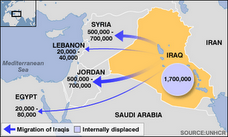Pullout Deadline Moves With War Bill
Washington Post
WASHINGTON (AP) - A Senate committee approved a $122 billion measure Thursday financing wars in Iraq and Afghanistan but also defies President Bush by calling on him to pull combat troops out of Iraq by next spring. The bill, approved by a voice vote, is similar to one the House began debating Thursday.
Both measures have drawn veto threats from the White House, which has said Congress must allow more time for the U.S. troop increase in Iraq to work.
Democrats, who have been trying to figure out how to pressure Bush to wind down the war, said the withdrawal language was necessary to force the Iraqi government to take more responsibility. It would require U.S. troops to begin leaving Iraq within four months of passage, and would set a nonbinding goal of March 31, 2008, for the removal of combat troops.
The New York Times:
Congress’s Challenge on Iraq
The House of Representatives now has a chance to lead the nation toward a wiser, more responsible Iraq policy. It is scheduled to vote this week on whether to impose benchmarks for much-needed political progress on the Iraqi government ù and link them to the continued presence of American combat forces. The bill also seeks to lessen the intolerable strains on American forces, requiring President Bush to certify that units are fit for battle before sending any troops to Iraq. Both of these requirements are long overdue. The House should vote yes, by an overwhelming, bipartisan margin.
....House Democrats have wisely moved beyond their earlier infatuation with mere deadlines. The benchmarks spelled out in this legislation, which also provides the next round of money for the war, require that the Iraqi government stop shielding and encouraging the Shiite militias that are helping drive the killing. United States and Iraqi security forces must be allowed to pursue all extremists, Shiite and Sunni, disarm sectarian militias and provide “evenhanded security for all Iraqis.” The benchmarks also require the Iraqi government to take measurable steps toward national reconciliation: equitably distributing oil revenues, opening up more political and economic opportunities to the Sunni minority and amending the constitution to discourage further fragmentation.
.... It would require the president to provide Congress, by July, with an initial detailed report on Iraq’s efforts to meet these benchmarks. By October, the Iraqi government would have to complete a specific set of legislative and constitutional steps. Failure to meet these deadlines would trigger the withdrawal of all American combat forces ù but not those training Iraqis or fighting Al Qaeda ù to be concluded in April 2008. If the benchmarks were met, American combat forces would remain until the fall of 2008.
The measure would also bar sending any unit to Iraq that cannot be certified as fully ready. It sets a reasonable 365-day limit on combat tours for the Army and a shorter 210-day combat tour limit for the Marines. As for how many troops can remain in Iraq ù until the House’s deadlines for withdrawal ù the legislation imposes no reduction on the level of roughly 132,000 in place at the start of this year.
Critics will complain that the House is doing the Pentagon’s planning. But the Pentagon and Mr. Bush have clearly failed to protect America’s ground forces from the ever more costly effects of extended, accelerated and repeated deployments. If Iraq’s leaders were truly committed to national reconciliation and reining in their civil war, there would be no need for benchmarks or deadlines. But they are not. If Mr. Bush were willing to grasp Iraq’s horrifying reality, he would be the one imposing benchmarks, timetables and readiness rules. He will not, so Congress must. American troops should not be trapped in the middle of a blood bath that neither Mr. Bush nor Iraq’s leaders have the vision or the will to halt.
Thursday, March 22, 2007
Subscribe to:
Post Comments (Atom)





No comments:
Post a Comment